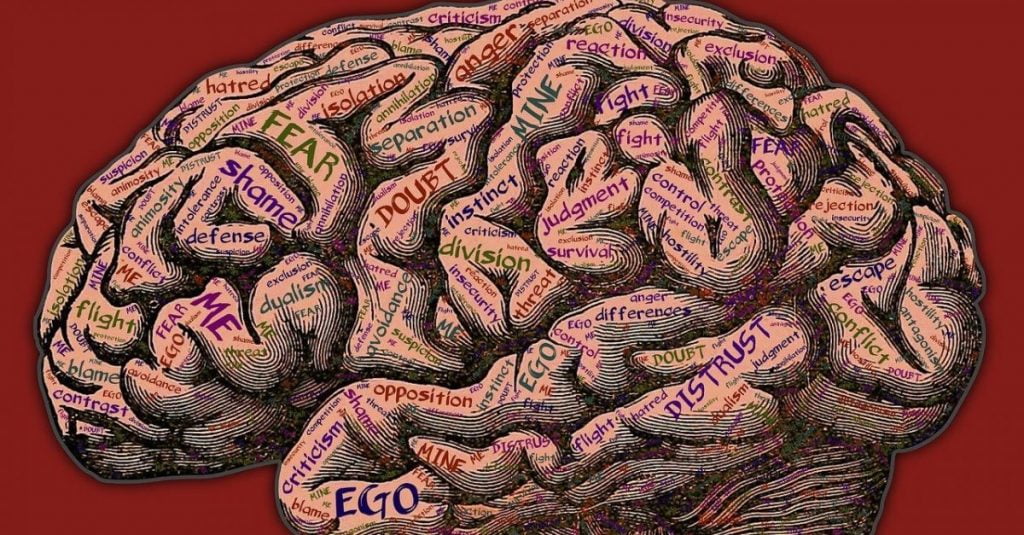Anxiety is widespread throughout modern society. In the UK alone, 8.2 million people are known to suffer from some form of it. Some people will get bouts of anxiety throughout their lives. Whereas others will suffer from it every day.
Fear and anxiety are baked into our genetics. It kept us alive when we still had a primitive existence, helping us to evade a sabretooth tiger. Today, however, more mundane things trigger our anxiety. For example, how many hours do we spend worrying about the opinions of others? Even though we know it is not a matter of life and death, we treat it like it were.
To further stain our collective mental health, the media manipulates our thoughts and creates panic. We are entering into a period of collective psychosis. A maddening of society.
The news bombards us with stories about the coronavirus, riots, gangs, violence, drugs, war, and the coming climate crisis. When the pandemic first hit, people worldwide stock-piled toilet rolls and pasta. The more you had, the safer you would be. This whole situation showed us just how prevalent anxiety is within society.
The media feeds us horror stories because when we are scared, we listen and watch more. It keeps us tuned in and makes them money. They need us to be sat at home and terrified.
Many treatments are available for anxiety. The right one will depend on the person and how severe the case is. A question that people sometimes ask me is: can a life coach or NLP help with anxiety? This post will answer that exact question.
What is a life coach?
Coaches are the people that get their clients to perform at their best. When a sports coach works with an athlete, they guide them to perfect their technique, build their abilities and reach their potential. Coaches who work with businesses help the managers and leaders of a company develop their strengths and overcome weaknesses. Therefore, growing the company.
Similarly, when clients hire a life coach, they look for someone to help them reach their full potential. The coach and the client work in partnership, focusing on achieving a goal.
Some people confuse therapy and coaching. However, they are very different. They may both use talking sessions, but that is largely the extent of the similarities. Some key differences between them are:
- Therapy focuses on the past. However, coaching is more interested in what your life is like now and
- how you can get a better future.
- The therapist will focus more on “the why” of your problem. Why are you depressed, anxious etc. Coaches will focus on getting to a solution.
- Therapy will focus on how you feel and what you are thinking. Whereas coaching will explore your beliefs and behaviours.
- Therapy is more long term and can go on for years. Coaching is more short term focused.
- A therapist may offer you advice for ways to solve your problems, whereas a life coach will not.
What Is NLP?
NLP (Neuro-Linguistic Programming) is the study of our thoughts, language, and behaviours. Coaches use NLP as an extra tool to get clients to reach their full potential and overcome any barriers standing in the way of their success.
NLP practitioners believe we all have strategies and models for almost everything we do.
Some of our strategies deal with the small things, i.e. how you lock the car?: Do you listen for a sound? Look for the flashing lights? Just push a button and forget about it?
Other strategies are more substantial, i.e. how do you request a pay rise from the boss?: Do you produce a report demonstrating your value? Do you book a meeting? or just ask? Do you give a lot of eye contact? Smile? Maybe the strategy is to just send an email and hope for the best?
NLP examines the unique strategies we all use in navigating the world. Many of these have positive outcomes, but sometimes our strategies can keep us trapped and feeling lost. There will be strategies that someone with anxiety uses that keep them stressed, nervous and full of worry.
What goes through your mind when your friend doesn’t call you back? How do you deal with a raised voice? What do you think when you see a contact on Facebook sitting on a beach drinking a mimosa? How you respond to these questions might indicate some level of anxiety.
A qualified and accredited NLP practitioner will help their clients build better strategies. Better strategies mean more happiness and less worry.

What is Anxiety?
Anxiety is a part of the human experience. We need it to some degree. Being anxious can keep us alive. When we cross a busy road, it’s beneficial to have some level of anxiety. With it, we will look for a safe crossing. Without it, we might take an unnecessarily dangerous risk.
Anxiety becomes a problem when it affects our everyday lives, stopping us from functioning the way we want to. Dangers may be blown out of proportion, and our mood can become difficult to control. People with anxiety may avoid situations, places, things, or people. Avoidance protects them from some perceived danger. For example, someone might avoid a social gathering for fear that the people there will judge them. Anxiety can begin at any point in someone’s life and can last for years, even decades.
Anxiety can take many different forms, and it can be triggered by a variety of things. Symptoms include negative mental chatter, nervousness, heart palpitations, rapid breathing, panic attacks, trouble concentrating, and continuous worry.
My personal experience with anxiety
Anxiety makes life hard. I know because I suffered with it through childhood and much of my adulthood.
In school, I was shy and kept myself to a small group of friends. I listened to the self-critical voice in my head blabbing away, always feeding me horror stories and self-critical thoughts. When a friend never called me back, I would create scenarios about what that meant. I assumed the worse in people and sometimes believed they had hidden ulterior motives.
Whenever I heard a police car go rushing past, my immediate thought was terrorism.
Furthermore, a scroll through social media only elevated my anxiety.
I knew I had a problem and went looking for solutions. I wanted to live a normal life. Below are just some of the treatments someone could use for anxiety. I have used some of these but not all.
Treatments for Anxiety
There are various treatments for anxiety. Some of the ones that I am more familiar with are below. You can find more treatments and information about anxiety on the NHS website.
- Mindfulness: This is practising awareness of the present moment and being less focused on the thoughts in your head. It usually involves meditation, but that does not mean it’s spiritual or you need to be religious. Regular meditation made me kinder to myself and stopped some of the negative chatter swirling around in my head.
- Sleep: How many hours of sleep do you get a night? There may be a problem If you are not getting at least 7-8 hours. Inadequate sleep raises blood pressure, worsens memory and causes stress. Therefore, getting the right amount of sleep is one of the keys to happiness. If you struggle to get to sleep, ensure the bedroom is cool, there are no distractions and give your brain a rest before you get into bed.
- Cognitive Behavioural Therapy: This therapy is about getting you to question why certain things make you anxious. It involves facing the things that make you frightened. When you do this, you’ll soon realise that they aren’t so bad. Although I have no experience with it, it is powerful at treating anxiety.
- Medication: There are a variety of different drugs that can be prescribed to someone who has anxiety. For highly anxious periods, a doctor might prescribe powerful, short term medication. Other patients will take long-term medication to help them deal with some of the pressures in their life. My experience with this is limited, but it can be successful in treating anxiety.
Can a life coach help with anxiety?
The one treatment left off the list above is a coach who uses NLP. To answer the question: Yes, A coach can help. However, a doctor is probably the best person to make a decision on your treatment.
I suffered from anxiety for years until I got my own coach. He helped me to pass through it. I learnt to use NLP on myself and have completely escaped the prison of anxiety. And for me, anxiety was a prison. It stopped me from doing so many things. It kept me trapped at home way too often.
Today, I am more confident, more outgoing, and more willing to try new things. I am striving to push myself to my full potential. I became a coach so no one has to suffer from the self-doubt and anxiety I had. It is why I specialise in building the confidence of my clients. It is why I enjoy my job. I love watching people turn over a new leaf and go on to become who they are destined to be.
Further information about anxiety
If you want to learn more about anxiety, I recommend reading Unwinding Anxiety By Judson Brewer MD, PhD. It has helped a lot of people get over their anxiety, and it could help you. It explains how our minds work, and what’s happening when we get anxious, and it gives practical ideas to live a life free from worry.
If you are interested in seeking coaching for something, book a session today. The first one is free and on me. It gives me a chance to discuss what you want to achieve and understand how I can best support you.





